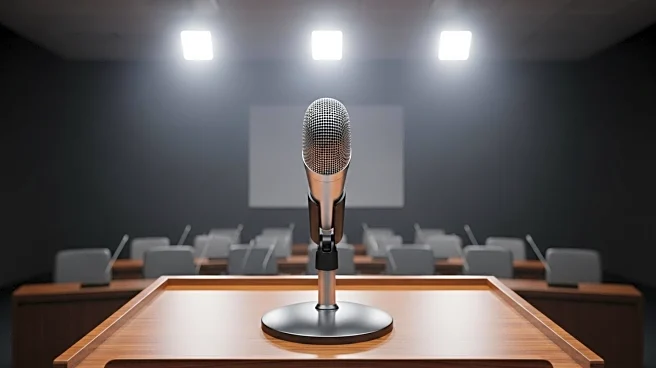What is the story about?
What's Happening?
The Pentagon has issued new press access rules requiring beat reporters to sign a pledge not to obtain or use unauthorized material, even if unclassified. Defense Secretary Pete Hegseth's policy has been met with widespread rejection from major news organizations, including ABC News, CBS News, CNN, NBC News, and Fox News. These outlets, along with others like Reuters and The New York Times, have condemned the rules, stating they threaten journalistic freedoms and core protections. The Pentagon Press Association has criticized the policy, arguing it gags employees and retaliates against reporters seeking unapproved information. The association warns of potential expulsion from the Pentagon for non-compliance, a move seen as unprecedented and a violation of the First Amendment.
Why It's Important?
The refusal by major media outlets to comply with the Pentagon's new rules underscores a significant tension between government control and press freedom. This development could impact how national security issues are reported, potentially limiting public access to critical information. The policy's rejection highlights the media's role in maintaining transparency and accountability within government operations. If enforced, these restrictions could set a concerning precedent for press access to government institutions, affecting the ability of journalists to report independently and inform the public. The situation also raises questions about the balance between national security and the public's right to know.
What's Next?
Some news organizations are considering legal action against the Pentagon's new rules, challenging their constitutionality. The ongoing dispute may lead to further negotiations or revisions of the policy. Media outlets are likely to continue covering the U.S. military, potentially relying on alternative methods to gather information. The Pentagon's stance may provoke broader discussions on press freedom and government transparency, with potential involvement from civil rights groups and legal experts. The outcome of this conflict could influence future policies regarding media access to government facilities and information.
Beyond the Headlines
The Pentagon's restrictive press access rules reflect broader concerns about government attempts to control information flow and limit scrutiny. This situation highlights ethical considerations regarding the role of the press in a democratic society and the importance of safeguarding journalistic independence. The policy's implications extend beyond immediate access issues, potentially affecting long-term media-government relations and public trust in both institutions. The controversy may also prompt discussions on the ethical responsibilities of journalists in handling sensitive information and the potential consequences of government-imposed limitations.















